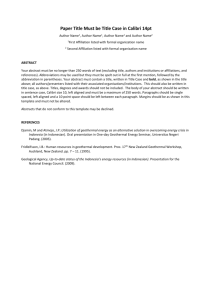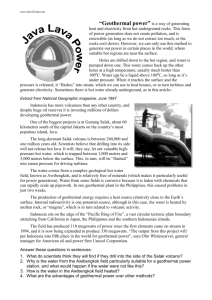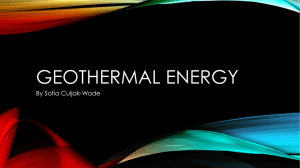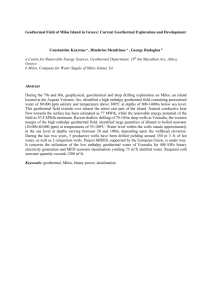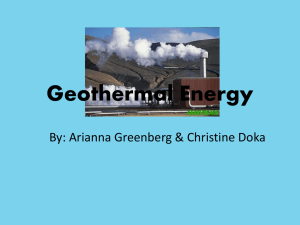Geothermal Lab - Dedman College
advertisement
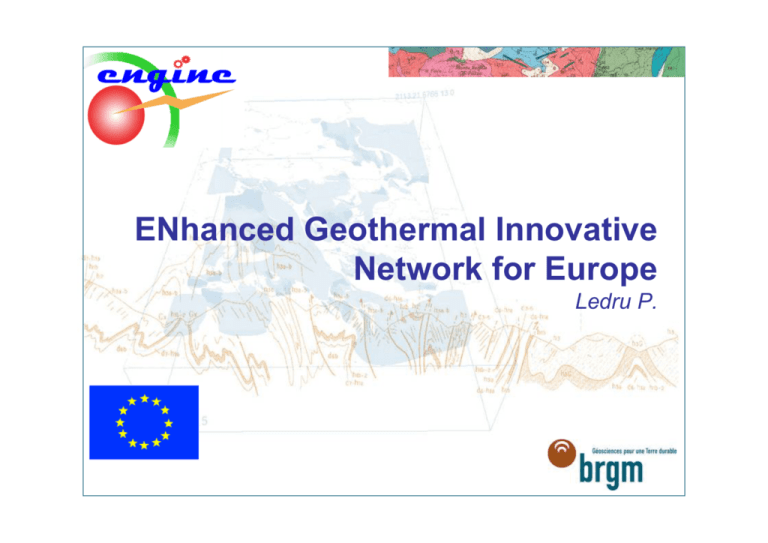
ENhanced Geothermal Innovative Network for Europe Ledru P. Geothermal activity in Europe Iceland Geothermal Heat Pumps Icelandic Deep Drilling project Alvsby Pyrzyce Guadalupe Açores Landau Paris Basin Heat Pumps Klapeida Podhale, Mszczonów, Pyrzyce, Uniejów Slomniki Groß Schönebeck Neustadt-Glewe Soultz-sous-forêt EGS Basel EGS Altheim Cozia-Calciulata Larderello Ferrara Bansko, Kocani, Gevgelia Izmir Soultz Groß Schönebeck Altheim Neustdat-Glewe District heating Enhanced Geothermal Systems test sites Electricity production, co generation Larderello, 1904-2006 Geothermal power and direct use production Geothermal direct use capacity 2005 13626 MWt Geothermal power capacity 2004, 1179 MWE France: 19 Others: 37,2 Russia: 79 Austria: 352 Germany: 504 Switzerland: 582 Hungary: 694 Denmark: 330 Norway: 600 Others: 3964 Italy: 607 Turkey: 1495 Iceland: 202 Sweden: 3840 Italy: 791 Iceland: 1844 Compilation, L. Rybach, GRC 2006 Geothermal Energy from Oil and Gas Wells, Dallas, 12-13 June 2007 >3 The strategy of the European commission and the R&D programs > Directive 2001/77/EC : doubling the contribution of renewable energy from 6 to 12% of total energy consumption by 2010. > The White Paper (Community Strategy and Action Plan, 1997) : doubling (500 to 1000 MW) of electricity production capacity, increase from 750 to 25000 MW for heat production capacity of geothermal origin by 2010 > To be compared with in 2004: electricity production capacity: 1179 MWE, and in 2005: heat production capacity 13626 MWt Geothermal Energy from Oil and Gas Wells, Dallas, 12-13 June 2007 >4 A paradox in 2005 > Europe is a pionneer for the development of geothermal energy • • • • • • • > Larderello Iceland Paris basin GHP in Scandinavia R&D in Soultz-sous-Forêts Power generation by binary plants … but there is no major ambition for the development of geothermal energy at the scale of Europe because: • • • • a lack of political support no coordination of communication compared to other lobbies no major companies involved the division of the scientific community Geothermal Energy from Oil and Gas Wells, Dallas, 12-13 June 2007 >5 A need for a co-ordination action about R&D in Enhanced Geothermal Systems > A need for building an innovative research network for Europe (An expression of interest from the EC FP6) > A renewed interest for the geothermal energy from deep sources Geothermal Energy from Oil and Gas Wells, Dallas, 12-13 June 2007 >6 Objectives of the coordination action > to motivate the scientific community to face up to the above-mentioned challenges > to capitalise the know-how acquired in the framework of the EGS Soultz experiment but also from the exploration and exploitation of Italy, Bouillante and Iceland geothermal fields > to define new integrated projects that will federate the scientific community working in the "geothermal field", in partnership with industry, in order to achieve the strategic objectives of the European Community Geothermal Energy from Oil and Gas Wells, Dallas, 12-13 June 2007 >7 It Ca aly, rib Ic b el Fr ean and, (R ance Isla hin -G nd s e e Po ), H rma lan un ny g d, Sp ary ain Strategy for defining targets for Geothermal energy Water/vapor Temperature Permeability the geodynamic context •the hydrosystems •the geology Geothermal Energy from Oil and Gas Wells, Dallas, 12-13 June 2007 >8 FP6 projects: a significant R&D investment CAMELIA: Multigeneration Energy Systems with Locally Integrated Applications GroundHit: Ground Coupled Heat Pumps of High Technology Low Bin: Binary systems ENGINE Coordination Action I-GET: Integrated Geophysical Exploration Technology >A total budget of 46,6M€ over 4 years and a support of 17,6M€ from EU dedicated to geothermal energy EGS (STREP): Soultz HITI (STREP): High-Temperature Equipment Geothermal Energy from Oil and Gas Wells, Dallas, 12-13 June 2007 >9 Enhanced Geothermal Systems: the concept > Enhancing and broadening geothermal energy reserves • • • • • • stimulating reservoirs in Hot Dry Rock systems, enlarging the extent of productive geothermal fields by enhancing/stimulating permeability in the vicinity of naturally permeable rocks enhancing the viability of current and potential hydrothermal areas by stimulation technology and improving thermodynamic cycles, improving drilling and reservoir assessment technology, improving exploration methods for deep geothermal resources defining new targets and new tools for reaching supercritical fluid systems, especially hightemperature down-hole tools and instruments Geothermal Energy from Oil and Gas Wells, Dallas, 12-13 June 2007 > 10 The EGS challenge RESOURCE USE COST RISK o o o o o o o exploration resource assessment resource management advanced drilling advanced stimulation efficient power cycles environmental impact Geothermal Energy from Oil and Gas Wells, Dallas, 12-13 June 2007 > 11 http://engine.brgm.fr/ Geothermal Energy from Oil and Gas Wells, Dallas, 12-13 June 2007 > 12 Coordination action breakdown structure: http://engine.brgm.fr/ ENGINE: ENhanced Geothermal Innovative Network for Europe A scientific and technical European Reference Manual for the development of Unconventional Geothermal Resources and Enhanced Geothermal Systems An updated framework of activities concerning Unconventional Geothermal Resources and Enhanced Geothermal Systems in Europe WP3 Investigation of Unconventional Geothermal Resources and EGS - The scientific and technological challenges of the exploration phase - Gaps, barriers and cost effectiveness Publications - state-of-the-art - proceedings of conferences - definition and analysis of bottlenecks and solutions WP4 Drilling, stimulation and reservoir assessment - Drilling technology, reservoir modelling and management - Gaps, barriers and cost effectiveness Publications - state-of-the-art - proceedings of conferences - definition and analysis of bottlenecks and solutions WP5 Exploitation, economic, environmental and social impacts - Integrated economic approach for costeffectiveness - Policy makers and public awareness - Gaps and barriers holding back development Publications - state-of-the-art - proceedings of conferences - definition and analysis of bottlenecks and solutions Best Practice Handbook and innovative concepts WP9 Risk evaluation for the development of geothermal energy Report on the integration of results in a Decision Support system WP8 Expertise on exploitation, economic, environmental and social impacts Synthesis on best practices, barriers holding back development and possible solutions WP7 Expertise on drilling, stimulation and reservoir assessment Synthesis on best practices, barriers holding back development and possible solutions WP6 Expertise on investigation of unconventional Geothermal resources and EGS Synthesis on best practices, barriers holding back development and possible solutions WP2 Information and dissemination system - General information - Information on training and education - Reports and results, publications - Data management - Publication policy - Connection with media Deliverables - a web site - access to databases, models and opensource software - on-line access to articles and reviews WP1 Project Management - 1 co-ordinator and secretary - follow up time / quality / cost - 1 executive Group - 1 steering committee - Connection with international agencies, national programmes, industrial partners Deliverables - quarterly reports to EU - stronger links with potential partners for new projects One major target: How to prioritise R&D needs? EGS technology Priority A Impact of innovation Priority B Impact of innovation Priority n Impact of innovation Resource investigation Topic 1 x% Topic 2 y% Topic n z% Drilling, stimulation and reservoir assessment … … … Exploitation, reservoir management and monitoring … … … Economic, environmental and social impacts … high … medium … low … Geothermal Energy from Oil and Gas Wells, Dallas, 12-13 June 2007 > 14 An efficient network: http://engine.brgm.fr/ FP6 Project Officer: J. Schuppers Executive Group President: C. Fouillac BRGM, C. Fouillac VUA, S. Cloetingh GFZ, R. Emmermann OS, O. Flovenz GEOWATT, L. Rybach Shell, J. Maas TNO, E. Elewaut FEDCO, Z. Sarmiento LAGEO, M. Monterrosa Co-ordination Project management BRGM, P. Ledru, A. Genter Steering Committee President: E. Huenges Vice President: A. Manzella WP1, BRGM, P. Ledru WP2, BRGM, P. Calcagno WP3, IGG, A. Manzella WP4, OS, S. Thorhallsson WP5, IE, M. Kaltschmitt WP6, GEOWATT, T. Kohl WP7, GFZ, E. Huenges WP8, CRES, C. Karytsas WP9, TNO-NITG, A. Lokhorst/J.D. van Wees P. Ledru E. Huenges, A. Manzella WP 9 WP 2... Stakeholder committee Axpo Holding, N. Zepf BUND, U. Bruchmann DALKIA, D. Givois EnBW, T. Koelbel ENEL, F. Batini, P. Romagnoli EDF, D. Fritsch EGS, G. Santucci IGA, K. Popovsky KCA DEUTAG, M. Beyer MINEFI, P. Dupuis RWE-DEA, C. Bücker Schlumberger, J. Cook SenterNovem, H. Schreurs Stichting Platform Geothermie, H. van Heekeren SUNCOR, A. Thompson TURBODEN, M. Gaia US expert panel, D. Blackwell International Energy Agency Geothermal Implementing Agreement National research and development projects Work Package 1 Other EU research projects Geothermal Energy from Oil and Gas Wells, Dallas, 12-13 June 2007 > 15 Extension of the network to Third countries (Mexico, El Salvador, Philippines) WP1, Project Management WP2, Information and dissemination system WP3. Investigation of UGR and EGS Launching Conf. Mid-term Germany (11/2206) Conference (France 2/2006) Italy (04/2007) WP6. Expertise on investigation of UGR and EGS WP4. Drilling, stimulation and reservoir assessment Mid-term Switzerland Conference (06/2006) Iceland (07/2007) WP7. Expertise on drilling, stimulation and reservoir assessment WP9. Risk evaluation for the development of geothermal energy Final Conference The Netherlands (Lithuania, 02/2008) (11/2007) WP5. Exploitation, economic, environmental and social impacts France (9/2006) Mid-term Conference (Germany 01/2007) Greece (09/2007) WP8. Expertise on exploitation, economic, environmental, social impacts Specialised workshops Beginning of contacts with the Stakeholder Committee Publication policy and Meeting management > Launching Conference Orléans, France > > Workshop 3 Zurich, Switzerland Workshop 5 Strasbourg, France http://engine.brgm.fr/ > Workshop 1 Potsdam, Germany > Mid-Term Conference Potsdam, Germany Publication policy > Next issue #7 June 2007 > #1 01/2006 > #2 04/2006 > #3 07/2006 http://engine.brgm.fr/ > #4 10/2006 > #5 12/2006 Geothermal Energy from Oil and Gas Wells, Dallas, 12-13 June 2007 > 18 A framework for some of the R&D issues that will result from the ENGINE project > > An illustration of the bottom-up approach to capitalise the knowhow and to define new integrated projects • • • Investigation of Unconventional Geothermal Resources and Enhanced Geothermal Systems Drilling, stimulation and reservoir assessment Economic, environmental and social impacts An updated framework of activities concerning Unconventional Geothermal Resources and Enhanced Geothermal Systems in Europe WP3 Investigation of Unconventional Geothermal Resources and EGS - The scientific and technological challenges of the exploration phase - Gaps, barriers and cost effectiveness WP4 Drilling, stimulation and reservoir assessment Publications - state-of-the-art - proceedings of conferences - definition and analysis of bottlenecks and solutions Publications - state-of-the-art - proceedings of conferences - definition and analysis of bottlenecks and solutions - Drilling technology, reservoir modelling and management - Gaps, barriers and cost effectiveness Geothermal Energy from Oil and Gas Wells, Dallas, 12-13 June 2007 WP5 Exploitation, economic, environmental and social impacts - Integrated economic approach for costeffectiveness - Policy makers and public awareness - Gaps and barriers holding back development Publications - state-of-the-art - proceedings of conferences - definition and analysis of bottlenecks and solutions > 19 A framework for some of the R&D issues that will result from the ENGINE project > to capitalise the knowhow and to define new integrated projects • Investigation Enhanced Geothermal Systems • • Drilling, stimulation and reservoir assessment Economic, environmental and social impacts An updated framework of activities concerning Unconventional Geothermal Resources and Enhanced Geothermal Systems in Europe WP3 Investigation of Unconventional Geothermal Resources and EGS - The scientific and technological challenges of the exploration phase - Gaps, barriers and cost effectiveness Publications - state-of-the-art - proceedings of conferences - definition and analysis of bottlenecks and solutions 6-8 November 2007 Defining, Exploring, imaging and assessing reservoirs for potential heat exchange - Potsdam, Germany, Workshop1 1-4 April 2007 Exploring high temperature reservoirs: new challenges for geothermal energy, Volterra, Italy, Workshop2 Geothermal Energy from Oil and Gas Wells, Dallas, 12-13 June 2007 > 20 Investigation of Unconventional Geothermal Resources and Enhanced Geothermal Systems > Geological knowledge • • Architecture, geometry and nature of the target deduced from geological context and structural analysis: a 3D model Geophysical methods are suitable but existing methods must be improved and used in combination with different, highly sensitive techniques in order to meet the specific requirements of modern geophysical exploration for geothermal purposes: links with IGET Geothermal Energy from Oil and Gas Wells, Dallas, 12-13 June 2007 > 21 Investigation of Unconventional Geothermal Resources and Enhanced Geothermal Systems > Geological knowledge > Finding heat at depth • • • Extension of large-wavelength heat-flow anomalies at depth is often inaccurate (insufficient knowledge of the causes of heat-flow anomaly and of thermal properties of the main lithologies) Several physical parameters are coupled with temperature and can be imaged by different geological, geophysical and geochemical methods The definition of possible targets for EGS could be improved by the use of a 3D modelling platform, in which all solutions from geological, geochemical and geophysical modelling, direct and inverse, could be combined and analysed Geothermal Energy from Oil and Gas Wells, Dallas, 12-13 June 2007 > 22 a 3D modelling platform Soultz fault model, GOcad Bouillante volcanic reservoir, EarthVision, BRGM Limagne clastic reservoir, 3D Geomodeller, BRGM Gross Schönebeck model, EarthVision, GFZ Geothermal Energy from Oil and Gas Wells, Dallas, 12-13 June 2007 > 23 Investigation of Unconventional Geothermal Resources and Enhanced Geothermal Systems > Geological knowledge > Finding heat at depth > Stress field • • • Ability of fault and fracture systems to channel fluids is directly dependant on the stress field. Stress field and hydro-fracturing are linked Mechanisms of rupture and propagation of an existing fault system and related displacement remain debated as well as the permeability associated with Favourable and unfavourable stress field conditions must be evaluated, depending of the different stimulation methods Geothermal Energy from Oil and Gas Wells, Dallas, 12-13 June 2007 > 24 > > > > > Smoothed HAC Uranium 10 0 40 20 Thorium Potassium 0.06 0.04 300 0.02 250 200 150 Depth (m) Visualisation of fractured zones In situ measurement of their properties Measurement of the stress field Evaluation of interaction between lithologies and fluid circulation Understanding the history Modelling the fractured reservoir 100 > Standart GR Complex interaction between lithologies, fractures and stress field 1600 Core 1800 Champ de contrainte Lithologie 2000 2200 2400 2600 2800 Fracture filling 3000 3200 Fracture 3400 3600 3800 4000 4200 4400 4600 4800 Cuttings 5000 Fracture Filling Geophysical logs The Soultz case history Imagery of fractures par by geophysical logging A framework for some of the R&D issues that will result from the ENGINE project > to capitalise the knowhow and to define new integrated projects • Investigation of Unconventional Geothermal Resources and Enhanced Geothermal Systems • Drilling, stimulation and reservoir assessment • Economic, environmental and social impacts An updated framework of activities concerning Unconventional Geothermal Resources and Enhanced Geothermal Systems in Europe WP4 Drilling, stimulation and reservoir assessment - Drilling technology, reservoir modelling and management - Gaps, barriers and cost effectiveness Publications - state-of-the-art - proceedings of conferences - definition and analysis of bottlenecks and solutions 29 Jun - 01 Jul 2006 Stimulation of reservoir and induced microseismicity - Zurich, Switzerland, Workshop3 1-05 July 2007 Drilling cost effectiveness and feasibility of high-temperature drilling Reykjavik, Iceland, Workshop4 Geothermal Energy from Oil and Gas Wells, Dallas, 12-13 June 2007 > 26 Cooper Basin AU Groß Schönebeck Soultz-sous Forets Landau Unterhaching Productive hydrothermal Basaltic rocks IS Commercial Potentially commercial HotDry Rock Suitable for reservoir enhancement* High natural permeability Zero *Mechanical, chemical or thermal stimulation, directional drilling etc. Geothermal Energy from Oil and Gas Wells, Dallas, 12-13 June 2007 > 27 mod.from USGS Drilling, stimulation and reservoir assessment > > > > Enhancing or engineering the reservoir is a key issue for EGS Mechanical and chemical stimulations are commonly used to enhance their hydraulic properties. Induced microseismicity, geochemical tracing and thermal evolution of the system is an exceptional opportunity to characterize the reservoir and its dynamics The success of these experiences is still a matter of trial and error, depending on the variety of geological contexts and site conditions. More detailed reviews are needed about some stimulation methods, and exchanges with hydrocarbon industry and underground nuclear waste and CO2 storage platforms are likely Geothermal Energy from Oil and Gas Wells, Dallas, 12-13 June 2007 > 28 Drilling, stimulation and reservoir assessment > As it is already partly expressed in the FP7 work program, researches should • • • • > define conceptual models for irreversible enhancement of permeability of the reservoirs analyse the distribution in time and space of the magnitude of seismic events in order to improve the 3D imaging of the fracture system and stress field set requirements for seismic monitoring and recommend management strategies for prolonged field operation, provide a methodology for the estimation of site-specific seismic hazard prior to development of potential sites for EGS. The induced earthquake in Basel on the 8th December 2006 reveals the urgent necessity to fill the gap in knowledge about this matter Geothermal Energy from Oil and Gas Wells, Dallas, 12-13 June 2007 > 29 A framework for some of the R&D issues that will result from the ENGINE project > to capitalise the knowhow and to define new integrated projects • • An updated framework of activities concerning Unconventional Geothermal Resources and Enhanced Geothermal Systems in Europe Investigation of Unconventional Geothermal Resources and Enhanced Geothermal Systems Drilling, stimulation and reservoir assessment • Economic, environmental and social impacts WP5 Exploitation, economic, environmental and social impacts - Integrated economic approach for costeffectiveness - Policy makers and public awareness - Gaps and barriers holding back development Publications - state-of-the-art - proceedings of conferences - definition and analysis of bottlenecks and solutions 14 - 16 September 2006 Electriicty generation from Enhanced Geothermal Systems Strasbourg, France, Workshop 5 13-14 September 2007 Increasing policy makers‘ awareness and public acceptance - Athens, Greece, Workshop 6 Geothermal Energy from Oil and Gas Wells, Dallas, 12-13 June 2007 > 30 Geothermal electricity generation in Europe Dry Steam Plants in MWel Flash Plants in MWel Austria Total Capacity in MWel Capacity by 2010 in MWel 1.4 1.4 7.4 14.7 20.7 0.2 0.2 25.2 10.4 172.1 392.1 790.5 890.5 16 35 110 228 14.7a France Germany Iceland Italy Binary Plants in MWel 161.7 770.5 Portugal 20 3.0 13.0b 110c Russia Switzerland 6 Turkey Europe 20.4 770,5 329.8 20.4 24.3 1,125.3 1,650.3 Compiled by Kaltschmitt & Frick, 2006 from WGC05 a Guadeloupe; b Azores; c thereof 9 MWel flash-binary unit Geothermal Energy from Oil and Gas Wells, Dallas, 12-13 June 2007 > 31 Economic, environmental and social impacts > > Electricity production from low enthalpy resources in Europe: a fairly young technology which lacks wide experience, both for the development of geothermal resources and power plant systems Discussion about the pros and cons of • • • • ORC vs. Kalina cycle, air vs. water cooling fancy vs. proven technology power vs. Combined Heat Power is of no interest in terms of a further development of geothermal energy use > The main task of project developers is the optimisation potential in terms of the design of the working fluid, the cycle and turbine designs as well as the cooling systems Geothermal Energy from Oil and Gas Wells, Dallas, 12-13 June 2007 > 32 Economic, environmental and social impacts > > Efficiency of a power plant cycle can be improved with an increasing technical effort and innovative ideas. Before being able to break into the market these technologies need to be tested, which is generally not possible on a purely commercial basis as technical and financial risks are induced Governments, national agencies and Europe must support the market access of such new and innovative technologies • > > The Renewable Energy Source Act (EEG) was introduced in Germany to facilitate sustainable development of energy supply in the interest of managing global warming, conserving nature and protecting the environment The choice of a Turboden-Cryostar binary power plant for the Soultz-sous-Forêts : an application of optimisation potential and the choice of an innovative technology Combining different energy options supplying heat on different temperature levels can result in a higher overall efficiency, and thus profitability, and hence be decisive for realising geothermal based electricity production Geothermal Energy from Oil and Gas Wells, Dallas, 12-13 June 2007 > 33 EGS activity in the German part of the Upper Rhine graben > > > The Renewable Energy Source Act (EEG) was introduced in Germany to facilitate sustainable development of energy supply in the interest of managing global warming, conserving nature and protecting the environment The EEG entered into force in 2000 and was amended on 1st of August 2004. Fees paid for electricity produced from geothermal energy: • • • • At least 15 cents per KWh up to and including a capacity of 5 MW, At least 14 cents per KWh up to and including a capacity of 10 MW, At least 8.95 cents per KWh up to and including a capacity of 20 MW At least 7.16 cents per KWh for a capacity of 20 MW and over • From Bestec, 2006 Geothermal Energy from Oil and Gas Wells, Dallas, 12-13 June 2007 > 34 EU-wide Feed-in tariffs for geothermal energy Austria: 7,00 ct/kWh Germany: up to 15,00 ct/kWh Belgium: 2,50 ct/kWh Greece: 7,31 ct/kWh Czech Republic: 15,56 ct/kWh Slovakia: 9,04 ct/kWh Estonia: 5,10 ct/kWh Slovenia: 5,85 + 2,52 ct/kWh France: 10 ct/kWh (overseas: 12) Spain: 6,49 + 2,94 ct/kWh •From Kaltschmitt, 2006 Geothermal Energy from Oil and Gas Wells, Dallas, 12-13 June 2007 > 35 An international framework and a renewed interest for the geothermal energy from deep sources > > > Development of geothermal energy requires the realisation of short term projects showing the use of cost-efficient geothermal energy and of medium to long term projects that concern Enhanced Geothermal Systems the Soultz experiment is considered as the international reference by the Australian investors and American scientists for whom EGS is one of the few renewable energy that can provide continuous base load-power The co-ordination of these short and long term projects requires a well organised scientific community at an international level, a restored political support and good links with industry and stakeholders Geothermal Energy from Oil and Gas Wells, Dallas, 12-13 June 2007 > 36 Hot Rock Projects in South Australia (from B. Goldstein) • South Australian heat flow anomaly Geodynamics Petratherm =MNGI Pacific Hydro Osiris Energy Geothermal Resources Torrens Energy 9 9 9 9 9 Eden Scopenergy Green Rock Eden (Tasman affiliate) Proactive Energy Origin Energy Resources • 92 GELs / GELAs over 43,440 km² • The 5-year GEL exploration and demonstration work programs correspond to $500+ million, and this excludes up-scaling and deployment projects • Habanero 1,2 Geodynamics 11 GEL / GELA Holders 9 9 9 9 9 9 • Pacific Hydro Can benefit from Commonwealth renewable energy initiatives: 1. Renewable Energy Certificates 2. REDI Grants 3. Circa $500 million in Federal grants to demonstrate low emissions technologies Just 1 GEL (500 km²) has hot rock emissionfree energy potential to yield electricity equivalent to several Snowy Mountain Hydro Schemes (1 SM approx = 550 MWe) Eden Geodynamics Osiris Proactive Eden Yerila 1 Petratherm Proactive Petratherm Blanche 1 Green Rock Eden Paralana 1B Proactive Torrens Regional power grid Geothermal Green Rock Eden Torrens 200 km Sedimentary basin (thermal blanket) Petratherm Geothermal Heat Flow 1,3,4 Scopenergy Origin Osiris A continent to explore… Groß Schönebeck Upper Rhine Valley Soultz-sous-forêt EGS Limagne Geothermal Energy from Oil and Gas Wells, Dallas, 12-13 June 2007 Bruchsal Karlsruhe Karlsruhe-Nord Hockenheim-Philippsburg Rastatt-Lichtenau-Rheinau Weinheim Neuried-Altenheim Mannheim Emmendingen Kehl am Rhein Dinkelberg Breisach Markgräfler Land Lahr Offenburg Neuried-Ichenheim Neuenburg am Rhein Heidelberg Goldscheuer Freiburg-West Schwetzingen Bietigheim Schriesheim Wiesloch Karlsdorf Rhust-Whyl Freiburg-West Speyerdorf Landau in der Pfalz Offenbach an der Queich Bellheim Speyer Riedstadt Bad Bergzabern Steinfeld …… > 38 The use of Oil and Gas wells Could we exploit the geothermal potential of North Sea oil fields as their oil runs out? Some have reservoir temperatures over 100º C and so electricity generation might be possible (J. Busby, 2006, BGS) > Geothermal energy applications have gained renewed interest in recent years. One of the interesting applications is the re-use of deep boreholes drilled by oil and gas industry for a Deep Borehole Heat Exchanger (DBHE). > (J. D. Van Wees, 2007, TNO) Geothermal Energy from Oil and Gas Wells, Dallas, 12-13 June 2007 > 39 From an ENhanced Geothermal Innovative Network for Europe to an European geothermal drilling program? > > > an effort of communication to be done to promote the geothermal energy as a cost-efficient alternative source of energy a need of good synthesis of the knowledge and collection of existing datasets for modelling and assessment of the resources, prior to drilling a need for a scientific exchange platform for: • • • promoting past and on-going experiences by making them visible and reproducible defining research projects that could be presented to the EU commission as a possible contribution for the future work programme of the FP7. defining an ambitious research program at the scale of Europe that will federate the research capacity and limit the financial risk by sharing the investment. Such a program, that could be for example an European geothermal drilling program requires a common approach of both scientist and stakeholders Geothermal Energy from Oil and Gas Wells, Dallas, 12-13 June 2007 > 40 Conclusions > A sound scientific and technical knowledge acquired in Europe during the 20th century • > A need for long-term collaborative research on international projects to develop Enhanced Geothermal Systems • > Conventional geothermal energy still benefits from ongoing improvements in conversion, heat distribution… and should become increasingly cost-effective (rise in energy prices, new environmental constraints, greenhouse gas reduction...) reference to the Soultz experiment for promoting new projects in Australia, Kamtchaka, Chile…, extension of existing geothermal fields, geothermal recovery from existing oil and gas operations… ENGINE, along with other initiatives (European Commission, IEA-GIA, MIT expert panel, IGA, EGEC…) can • • • contribute to the construction of an international strategy consolidate the available information systems propose spin-off projects that will receive the support of stakeholders, decision makers and private investors. Geothermal Energy from Oil and Gas Wells, Dallas, 12-13 June 2007 > 41
